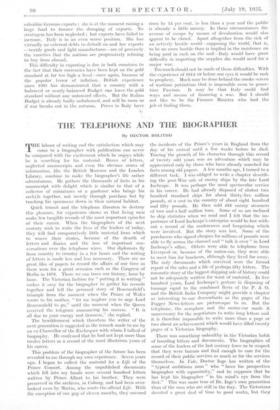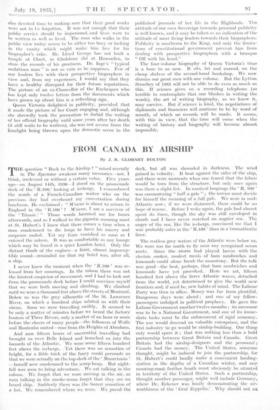THE TELEPHONE AND THE BIOGRAPHER
By HECTOR BOLITHO
THE labour of writing and the satisfaction which may come to a biographer with publication can never be compared with the excitement which he enjoys while he is searching for his material. Boxes of letters, neglected manuscripts and even the obvious stores of information, like the British Museum and the London Library, combine to make the biographer's life rather adventurous. He gathers the thousands of facts in his manuscript with delight which is similar to that of a 'collector of miniatures or a gardener who brings his orchids together, not merely through purchase but by tracking his specimens down in their natural habitat.
Quick transit and the telephone threaten to destroy this pleasure, for experience shows us that living men make few tangible records of the mcist important episodes of their career. When the biographers of the next century wish to write the lives of the leaders of today, they will find comparatively little material from which to weave their stories, because of the dearth of letters and diaries and the loss of important con- versations over the telephone wires. Our diplomats fly from country to country in a few hours and the writing of letters is made less and less necessary. There -are no great files- of papers to record the affairs of our time as there were for a great occasion such as the Congress of Berlin in 1878. There we can trace our history, hour by ,hour. The Victorian fashion for "putting it in writing-" makes it easy for the biographer to gather •his records together and tell the personal story of- Beaconsfield's triumph from the moment when the Prince of Wales wrote to his mother, "let me implore you to urge Lord Beaconsfield to go," until the moment when the Queen received the telegram announcing his success. "It is all due to your energy and firmness," she replied.
The bewilderment which threatens the writer of the next generation is suggested in the remark made to. me by an ex-Chancellor of the Exchequer with whom I talked of biography. He confessed that he had not kept more than twelve letters. as a record of the most illustrious years of his- career.
This problem of the biographer of the future has been -revealed to me through my own experience. Seven years -ago, I began to collect the material for a Life of the Prince Consort. Among the unpublished documents which fell into my hands were several hundred letters written by Prince Albert to his brother.. They were preserved in the -archives, in Coburg, and had been over- -looked even by Martin, who wrote the official Life. With the exception of one gap of eleven months, they covered the incidents of the Prince's years in England from the day, of ,his arrival, until a few weeks before he died. Tracing the growth of his character through this record of twenty odd years was an adventure which may be appreciated only by those who have already searched for facts among old papers. A few months ago, I turned to a different task. I was obliged to write a chapter describ- ing the post-War sale of enemy ships by the late Lord Inchcape. It was perhaps the most spectacular service in his career. He had -already disposed of alnfost two hundred standard ships for about thirty-five million pounds, at a cost to the country of about eight hundred and fifty pounds. He then sold 418 enemy steamers of two and a half million tons. Some of us are inclined to skip statistics when we read and I felt that the im- portance of Lord Inchcape's enterprise would be lost with- out a record of the conferences and bargaining which were involved. But the story was lost. Some of the purchasers who signed cheques for millions of pounds were able to fly across the channel and "talk it over" in Lord Incheape's office. Others were able to telephone from Liverpcol or, because of the motor-car, they were able to meet, him for luncheon, although they lived' Tar-away. The only documents which survived were the formal report of the sales and a file of perhaps fifty letters. The romantic story of the biggest shipping sale of history could not be adequately written for want of material. - -dn five hundred years, Lord Inchcape's gesture in disposing of tonnage equal to the combined fleets of the P. & 0. and the British India Company might provide a chapter as interesting to our descendants as the pages of the Fugger News-letters are picturesque to us. But the telephone, the aeroplane and the motor-car • made it unnecessary for the negotiators to write long letters and. it is therefore impossible to write more than a page or two about an achievement which would have filled twenty pages of a Victorian biography.
There was something- unhealthy in the Victorian habit of hoarding letters and documents. The biographies of some of the leaders of the last century force -us to suspect that they were human and frail enough to care for the record -of their public services as much as for the services themselves. In Vale, Doctor Inge has written of the "typical • ambitious -man" who "faces his prospective biographer • with equanimity," and he supposes that he has kept his biographer "in his mind's eye from the first." This was more true of Dr. Inge's own generation than of the men who-are still in the fray. The Victorians devoted a great deal of time to 'good works, but they also devoted time to making sure that their good works were not to le forgotten. It was not enough that their Public - service should be impersonal, and 'lives were to be written as well as lived. The man who walks in the public view today seems to be either too busy or lacking in the vanity which might • make him -live for his biographer's , sake. Mr. Lloyd George has not built a temple at Churt, as Gladstone did at Hawarden, to store the records of his greatness. Dr. Inge's "typical ambitious man " is not as vain as he supposes. Pew of our leaders live • with . their prospective biographers in view and, from my experience, I would say that they have a healthy -disregard for their future reputations. The picture of an ex-Chancellor of the Exchequer who has kept only twelve letters. from the documents which have grown up about him is a refreshing sign. • Queen Victoria delighted in publicity, provided that. it made the picture of her Court 'engaging and, although she shrewdly took the precaution to forbid the writing. of her official biography until some years after her death. (it still waits tube written), she was not averse from the' limelight being thrown upon the domestic scene in the published' journals of her life in the Highlands.; The' attitude 'of our own Sovereign towards personal publicity is well known, and it may be taken as an indication of the attitude of most living leaders towards-their biographers.- Publicity is anathema to the King, and only the limita- tions of constitutional government prevent. him from, dealing with prospective biographers with a brusque.
" Off with his head." • The four-volume biography of Queen Victoria's time is a bore to us now. It sits, fat and unread, on the cheap shelves of the second-hand bookshop. We now. dismiss our great men with one volume. But the Lytton. Strachey of .1985 will not be able to do even as much as. this. If science gives us a • recording telephone (so- terrible to contemplate that one blushes in writing the, words), the art of writing biography, as we know it, may survive. But if science is kind, the negotiations of diplomats and financiers will continue to be by word of. mouth, of which no records will be made. It seems,, with this in view, that the time, will come when the, writing -of history and biography 'will become almost impossible.



























































 Previous page
Previous page